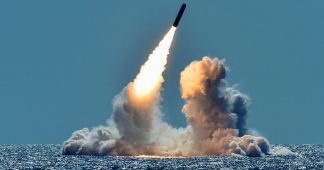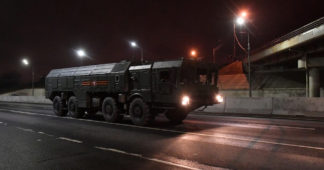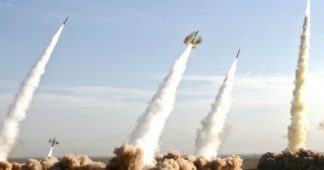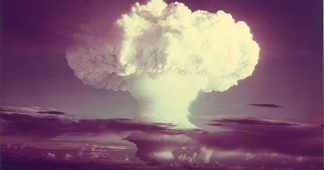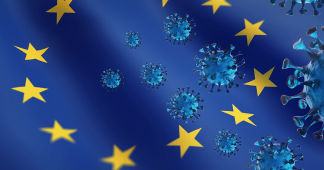By Dimitris Konstantakopoulos
In a previous article we explained why we believe that the West’s and NATO’s aggressivity towards Russia, in the Ukraine and other places, deep inside the former USSR, carries with it the very real possibility of a major nuclear conflict, able to destroy, at a minimum a large part of the European continent, and at a maximum, all humanity.
The western press and political forces are simply not discussing this aspect of the crisis around Ukraine. They probably believe that the probability of a nuclear war is something simple citizens should not care about, being a subject for career politicians and generals to decide on. As we have already explained, the very fact that such subjects are not discussed publicly is one more indication that we are living already inside a very dangerous, new kind of post-modern totalitarianism. And this situation constitutes by itself one of the main factors which may facilitate an ultimate disaster. We are in Europe at a point where we are having very intense debates about whether or not to wear masks, we are organising demonstrations about the COVID related measures, but hardly anybody is discussing the very real chance of humans being annihilated as a species as a result of a nuclear conflict made much more probable because of NATO policies! We have not seen even one mass demonstration in Europe against the visible prospect of a nuclear war.
We cannot of course calculate the probability of that happening. (For a quite interesting game of predictions, you may look for example to Michael Clare’s interview Why Do Men Keep Making War? An Interview with Michael Klare). But it is utterly irresponsible to consider such a possibility as non-existent. In reality the only reason western press and political forces are not discussing this possibility is their fear to see the public questioning NATO’s policies and begin thinking about their potential cost.
One gets the impression that we are, in Europe and the US, in the middle of a process of deep fuddle. With the probable exception of the period between Napoleon’s defeat and the 1830 or 1848 revolutions, modern European societies have never lived through a period of such decline and apathy, they have never resigned so much from the ambition to be the subjects of their history.
The risk of a nuclear conflict between the US and Russia is now more important than at any other time since the Berlin (1961) and Cuban Missile Crisis (1962), owing to five factors:
-
The Destruction of Arms Control
The whole structure of the system of arms control treaties signed during the three decades after the Cuban crisis and as a result of this crisis – and of the understanding that a nuclear war is possible, but that victory in such a war is impossible – has collapsed, as the US has unilaterally abandoned them (ABM, INF, Open Skies). Only the START Treaty was saved at the last moment by Biden. Not only have the treaties themselves been abolished, but the “ideological”, strategic and intellectual foundations which made them possible and upon which they were based, enshrined in the notions of “parity”, of “strategic stability” and of “MAD” (Mutually Assured Destruction) – the “mad” answer to the “madness” of the nuclear weapons – were abandoned. The codes of behaviour, communication and mutual respect between the two nuclear superpowers have disappeared. As a result of the concentration of enormous power, a monstrous, degenerate and dehumanised political personnel has appeared in the centre of the western system, examples of which are provided by Dick Cheney, Benjamin Netanyahu and, much more, people like Hillary Clinton and Donald Trump, the twin expressions of the descent of the superpower into madness and psychopathy. (Hillary Clinton has compared Putin to Hitler and has enjoyed live the humiliating execution by a mob, orchestrated by CIA killers, of Colonel Quadaffi, with whom one may disagree of course, but who was executed in that way not for any crimes but because he had been one of the leaders of the Arab and African anti-colonial struggles after WWII).
It is true that Biden is one of the very rare US politicians who seems to remember still the lessons of the Berlin and Cuban crises and often makes reference to the notions of strategic stability, of predictability and of the unacceptability of any nuclear conflict. But is he able to impose those views in his own camp and to do the changes of policy those principles require? Does he control the western establishment? Here, history seems to need a kind of a Roosevelt, Eisenhower, Kennedy or de Gaulle to be able to confront the problems ahead of it, but such personalities were the product of very different societies. And it also needs a large mass movement against war, imperialism and nuclear war, like the one the West always had, from 1945 until the enormous demonstrations against the invasion of Iraq in 2003 by the US and its satellites (Britain, Poland, Australia). We have nothing of the sort now.
-
Pursuing world domination
A large part of the US and the “wider West” establishment is in no mood to accept that it does not possess the omnipotence it appeared to possess after the dissolution of the USSR in 1989-91. Only very few people, like Zbignew Brzezinski before his death, Richard Haas or Graham Allison, seem to accept the obvious reality that the West cannot dominate the whole planet, and that if it tries to accomplish such a goal, it will lead to a global catastrophe. The emergence of Far Right forces with an irrational ideology, in the very centre of the western system (like Trump) is the answer of a wing of the establishment to the lack of realism of the imperial totalitarian project to rule all the world and not to accept alternative power centres with the degree of freedom Russia, China or even middling powers like Iran possess. As there is not any rational way to accomplish the domination dream, some forces are inclined to quit realism itself (http://www.defenddemocracy.
-
Points of unclear sovereignty
There are many areas of disputed sovereignty where the fire can easily be lit, first and foremost the Donbass, as a result of the undemocratic way in which the USSR (and Yugoslavia) was dissolved. By that we mean the disrespect of both the result of the Soviet referendum of March 1991, when Soviet citizens voted, in their overwhelming majority, for the preservation of the USSR and of the disrespect of the right of nations to self–determination. The supposedly new states which were created as the result of the dissolution of the USSR comprise large entities inhabited by compact populations of other, minority nationalities, as it happens with the republics of the Donbass and Lugansk, Transdnistria, South Ossetia, Abkhazia, Nagorno-Karabakh (or in the Balkans, Kosovo and Bosnia) and so on. Formally, these areas belong to the Ukraine, Moldova, Georgia, Azerbaijan etc., that is, to states whose main nationalities (except for Moldovans) have pursued a bloody oppressive policy against the minority nationalities residing there, while at the same time they have allied with NATO against Russia. Any attempt to restore these regions to the sovereignty of Kiev, Chisinau, Tbilisi and Baku, as Mr. Stoltenberg, the stupid and criminal chief of NATO is asking now every second day, will mean war – and any such war will tend to become a war between East and West.
-
The resignation of societies
Today, there is no strong anti-war and anti-nuclear movement that has shaken western societies in the past, after 1945, as was the case during the huge demonstrations against the war in Vietnam and the invasion of Iraq, or with the support of so many brilliant Europeans and Americans, carriers of a superior conscience, to the revolutions of the colonies, such as Algeria, Cyprus, Vietnam, Cuba and so many others.
The European states are more dependent today than at any other time in their history on the United States, the big international banks and various Israeli lobbies. Even France, since the election of Nicolas Sarkozy, has lost the characteristics of a relatively sovereign and independent state (the only one in Europe after WWII). It has returned fully to NATO and has reversed its traditional Arab and African policies, in particular by taking the lead in the campaign for the destruction of Libya. Israeli diplomacy has an enormous, unprecedented influence on the Quai d’ Orsay, the most impressive demonstration of which was when the Jewish organisations in France (CRIF) forbade President Sarkozy the right to appoint Hubert Védrine as Foreign Minister! Another example of the enormous, determining influence of the Israeli lobby over French foreign policy was the role of pseudo-“philosopher” BHL in launching the war which led to the destruction of Libya.
But besides such phenomena, there are more general trends like the enormous rise of the influence of the “Empire of Finance”, of big international financial capital and the loss of most of the “national” characteristics of the European ruling classes within the context of globalisation. All that is accompanied by the disappearance of the class of critical intellectuals, who have expressed in the West, in Europe and also in the States, the consciousness of societies from the Rennaissance until 1980. There is no more telling indication of the depth of the western decline than the appearance of people like Zemmour or Finkelcraut in the country of Voltaire and Hugo, of Camus and Sartre, the “mother” of modern European democracy and culture.
This factor is one of the most important in deciding whether or not if there will be a war. Even in the nuclear era, war remains the continuation of politics by other means, as Clausewitz defined it. Western political and media leaders know that; they know that ideas acquire material strength when millions of people believe them, and this is why Western media are now full of all sorts of lies and disinformation about the situation in the Ukraine, using the same method they have already used before the attacks on Yugoslavia, Iraq, Greece (with economic means), Libya, Syria etc.
Of course weapons, the correlation of material forces, is an important factor as far as wars are concerned, but equally important is the weapon of ideas to decide whether or not a war will be launched, and its outcome.
The United States for example had a monopoly of the atomic bomb between 1945 and 1949. They could have used it to unleash the Third World War against the USSR that powerful forces in the US and British establishment had been preparing since 1943. But they did not do it, because US and European public opinion would have opposed them, because people remembered very well at that time what war meant, because the Soviet Union, the main power that defeated Hitler, had enormous prestige worldwide, because in half of Europe, France, Belgium, Italy and the Balkans, there were very powerful, armed communist resistance movements and because De Gaulle would not turn against Russia. It was not the correlation of forces or the superiority of weapons: it was rather the “correlation of ideas” which decided the question of launching or not launching WWIII between 1945 and 1949. It was the same factor, the factor of ideas, which led the US armed forces to their defeats in Vietnam, in Afghanistan and Iran or the Israeli army to its defeat in Lebanon, in spite of their overwhelming military superiority.
It is for that reason that we believe that the absence, today, of any mass reactions to the escalation of NATO aggression in Eastern Europe and the terrible possibility of a destructive nuclear war in Europe is a major factor that makes it more likely.
-
War is a way out of the crisis
There is also a deeper reason, and this is the systemic crisis of western capitalism, comparable to the big crises of the past and even worse, as it has now acquired also an ecological and technological dimension. One century ago, confronted with a crisis of comparable depth, the system of western capitalism produced three types of answers: Keynesian Reform (Roosevelt), Fascism and War (Hitler), Revolution (Lenin and Mao). We must wait similar products now.
In reality we already have the equivalent of a proto-fascist tendency (Trump, Netanyahu, European Far Right, Modi, Bolsonaro), we have a very timid reformist tendency (Biden) and we have very few forces struggling for a deep systemic transformation. Russia and China, which represent objectively an important external opposition to Western Capitalism and Imperialism, remain rather conservative, not radical powers.
The drive to war (against Russia, against China, against Islam, against popular classes in the West, against civilisation, against Nature), the transformation of war into a new norm, the appearance of the Disaster Capitalism and Imperialism, which does not aim at controlling, but at disrupting the process of accumulation of capital, is not an accident. It is a symptom of the depth of the systemic crisis of the dominant economic, international and civilisational system. Such a crisis will most probably lead either to a global disaster or to the deep transformation of the existing system in the long run (which is not so distant, given the rapidity of the incoming ecological crisis and also the introduction of all sorts of technological factors affecting the very foundations of life and civilisation, such as AI or biotechnology).
Even now many people in the Russian elite do not understand and they cannot explain why the Americans are attacking Russia. They thought that by adopting Capitalism, they would become friends with America. But it is in the nature of Capitalism to dominate and to colonize, Capitalism is not only an economic, it is also a civilization and a geopolitical system, and for this reason it continued the Cold War even after the fall of “communism”. If it was not so there would be no need for Russia or China to make their revolutions in the 20th century, they would be able to develop in the context of capitalism. They were unable to do it and this is what has pushed them to adopt Communism.
The existence of nuclear weapons is a relative barrier to war, but only relative. After all, no one can easily imagine a geopolitical antagonism which will go on unabated for centuries without provoking a clash. Stanley Kubrick has presented us a possible way which can get us to a nuclear disaster in his superb Dr. Strangelove, inspired by real persons who happen to have been the mentors of nowadays Neocons. Much later, another film, “The War of the Roses”, described very well how a couple which gets trapped into an antagonism and does not find a way to retreat, finally arrives at mutual extinction.
And even if the Cold War with Russia or China does not become a Hot War, it will guarantee, if continued, our destruction by other means. It is impossible to address any problem, like for example the climate crisis, in the atmosphere of Cold Wars.
This is what makes a new kind of “Zimmerwald Conference” more important now than back in 1915. We will examine this question in our next article.
